International Business Ethics: Theories, Stakeholders, and Practices
VerifiedAdded on 2022/08/16
|8
|2442
|29
Essay
AI Summary
This essay provides a detailed analysis of international business ethics, beginning with a comparison of morals and ethics, highlighting their differences and origins. The paper then delves into various ethical perspectives, including utilitarianism, Rawls' Justice as Fairness, Confucianism, Altruism, and Kantian ethical theory. For each theory, the essay outlines its core principles, advantages, and disadvantages, specifically focusing on the benefits and harms experienced by stakeholders. Real-world examples are used to illustrate the practical application of these theories and their implications in the context of international business. The discussion covers the ethical considerations involved in decision-making, the impact on different parties, and the importance of ethical frameworks in shaping business practices.
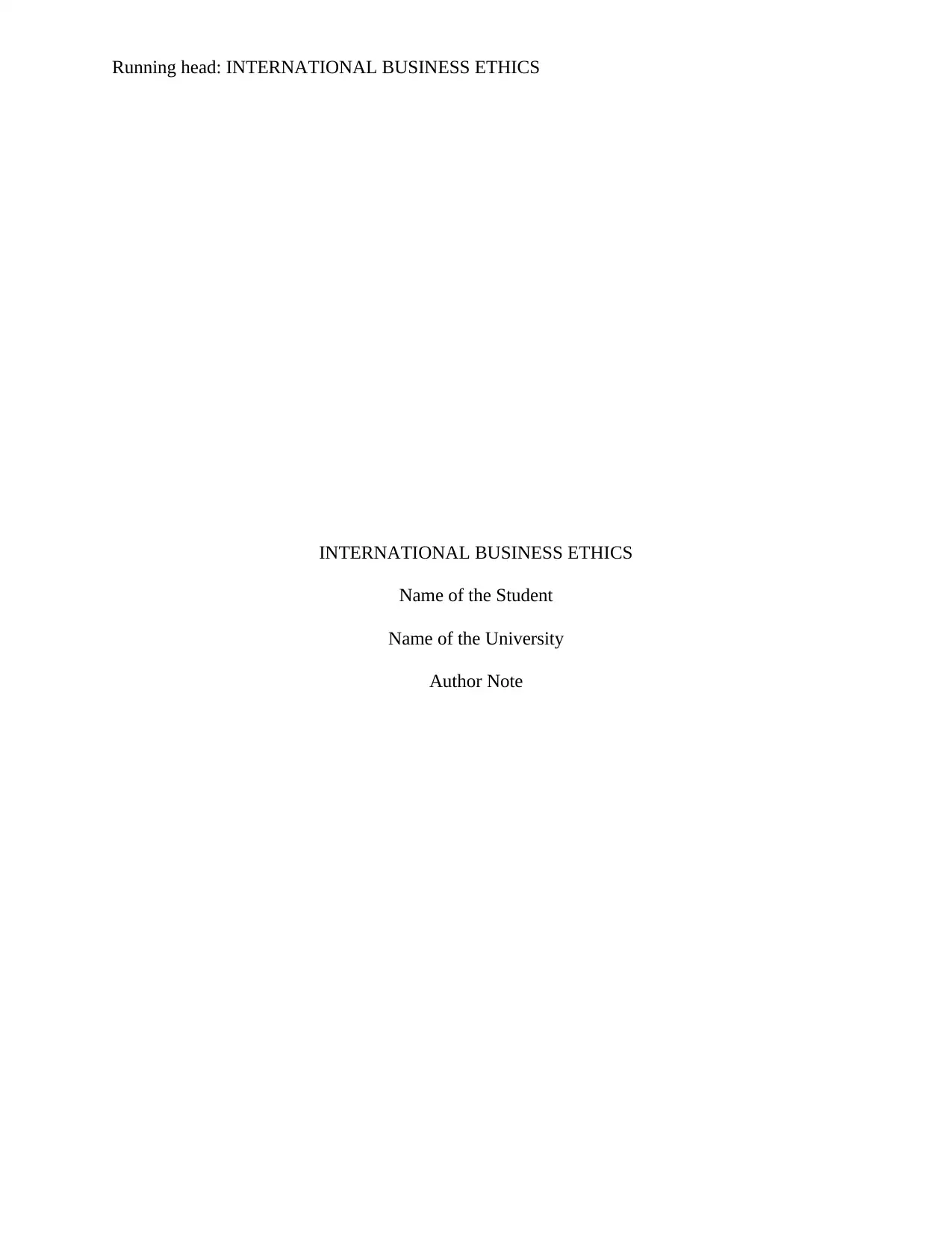
Running head: INTERNATIONAL BUSINESS ETHICS
INTERNATIONAL BUSINESS ETHICS
Name of the Student
Name of the University
Author Note
INTERNATIONAL BUSINESS ETHICS
Name of the Student
Name of the University
Author Note
Paraphrase This Document
Need a fresh take? Get an instant paraphrase of this document with our AI Paraphraser
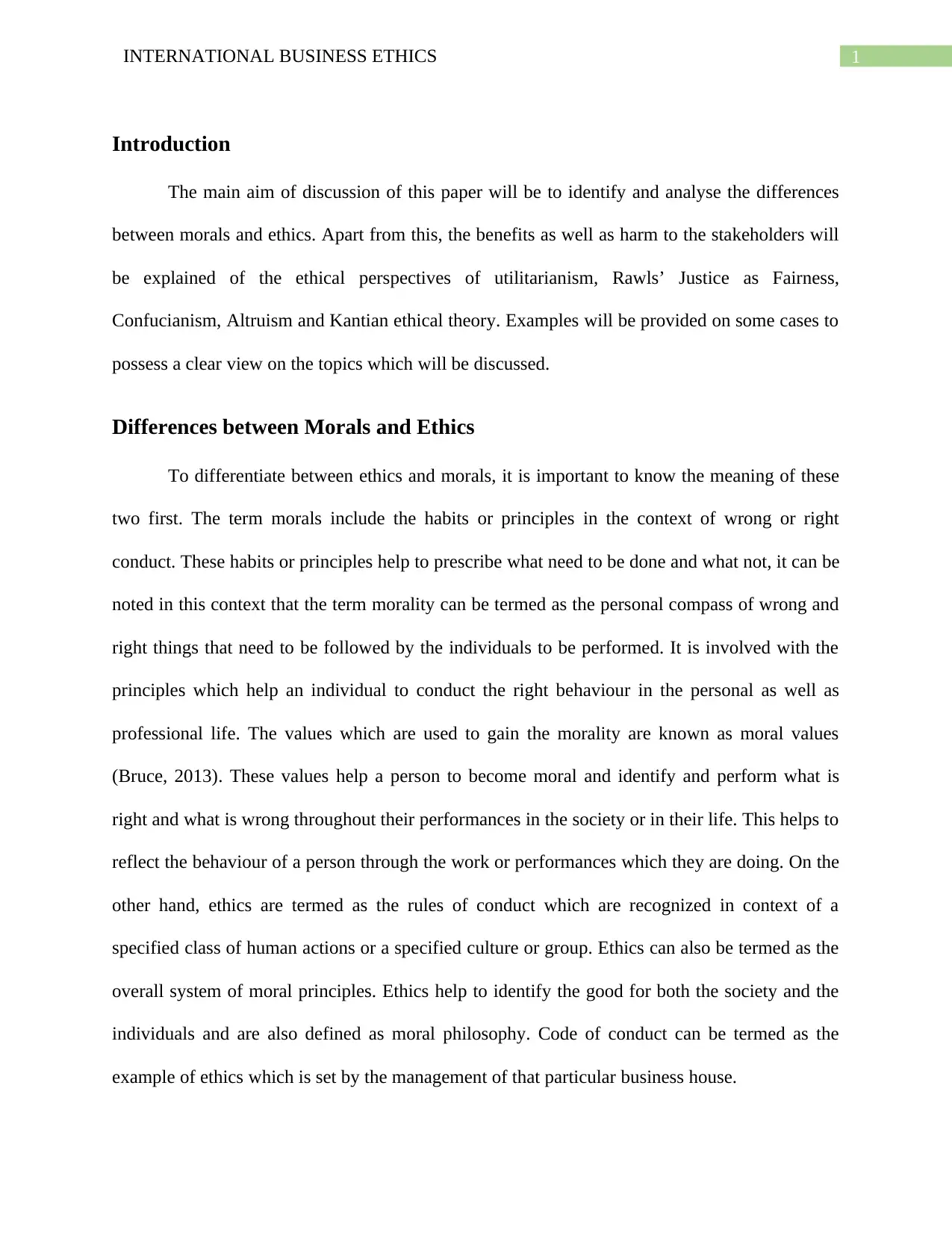
1INTERNATIONAL BUSINESS ETHICS
Introduction
The main aim of discussion of this paper will be to identify and analyse the differences
between morals and ethics. Apart from this, the benefits as well as harm to the stakeholders will
be explained of the ethical perspectives of utilitarianism, Rawls’ Justice as Fairness,
Confucianism, Altruism and Kantian ethical theory. Examples will be provided on some cases to
possess a clear view on the topics which will be discussed.
Differences between Morals and Ethics
To differentiate between ethics and morals, it is important to know the meaning of these
two first. The term morals include the habits or principles in the context of wrong or right
conduct. These habits or principles help to prescribe what need to be done and what not, it can be
noted in this context that the term morality can be termed as the personal compass of wrong and
right things that need to be followed by the individuals to be performed. It is involved with the
principles which help an individual to conduct the right behaviour in the personal as well as
professional life. The values which are used to gain the morality are known as moral values
(Bruce, 2013). These values help a person to become moral and identify and perform what is
right and what is wrong throughout their performances in the society or in their life. This helps to
reflect the behaviour of a person through the work or performances which they are doing. On the
other hand, ethics are termed as the rules of conduct which are recognized in context of a
specified class of human actions or a specified culture or group. Ethics can also be termed as the
overall system of moral principles. Ethics help to identify the good for both the society and the
individuals and are also defined as moral philosophy. Code of conduct can be termed as the
example of ethics which is set by the management of that particular business house.
Introduction
The main aim of discussion of this paper will be to identify and analyse the differences
between morals and ethics. Apart from this, the benefits as well as harm to the stakeholders will
be explained of the ethical perspectives of utilitarianism, Rawls’ Justice as Fairness,
Confucianism, Altruism and Kantian ethical theory. Examples will be provided on some cases to
possess a clear view on the topics which will be discussed.
Differences between Morals and Ethics
To differentiate between ethics and morals, it is important to know the meaning of these
two first. The term morals include the habits or principles in the context of wrong or right
conduct. These habits or principles help to prescribe what need to be done and what not, it can be
noted in this context that the term morality can be termed as the personal compass of wrong and
right things that need to be followed by the individuals to be performed. It is involved with the
principles which help an individual to conduct the right behaviour in the personal as well as
professional life. The values which are used to gain the morality are known as moral values
(Bruce, 2013). These values help a person to become moral and identify and perform what is
right and what is wrong throughout their performances in the society or in their life. This helps to
reflect the behaviour of a person through the work or performances which they are doing. On the
other hand, ethics are termed as the rules of conduct which are recognized in context of a
specified class of human actions or a specified culture or group. Ethics can also be termed as the
overall system of moral principles. Ethics help to identify the good for both the society and the
individuals and are also defined as moral philosophy. Code of conduct can be termed as the
example of ethics which is set by the management of that particular business house.
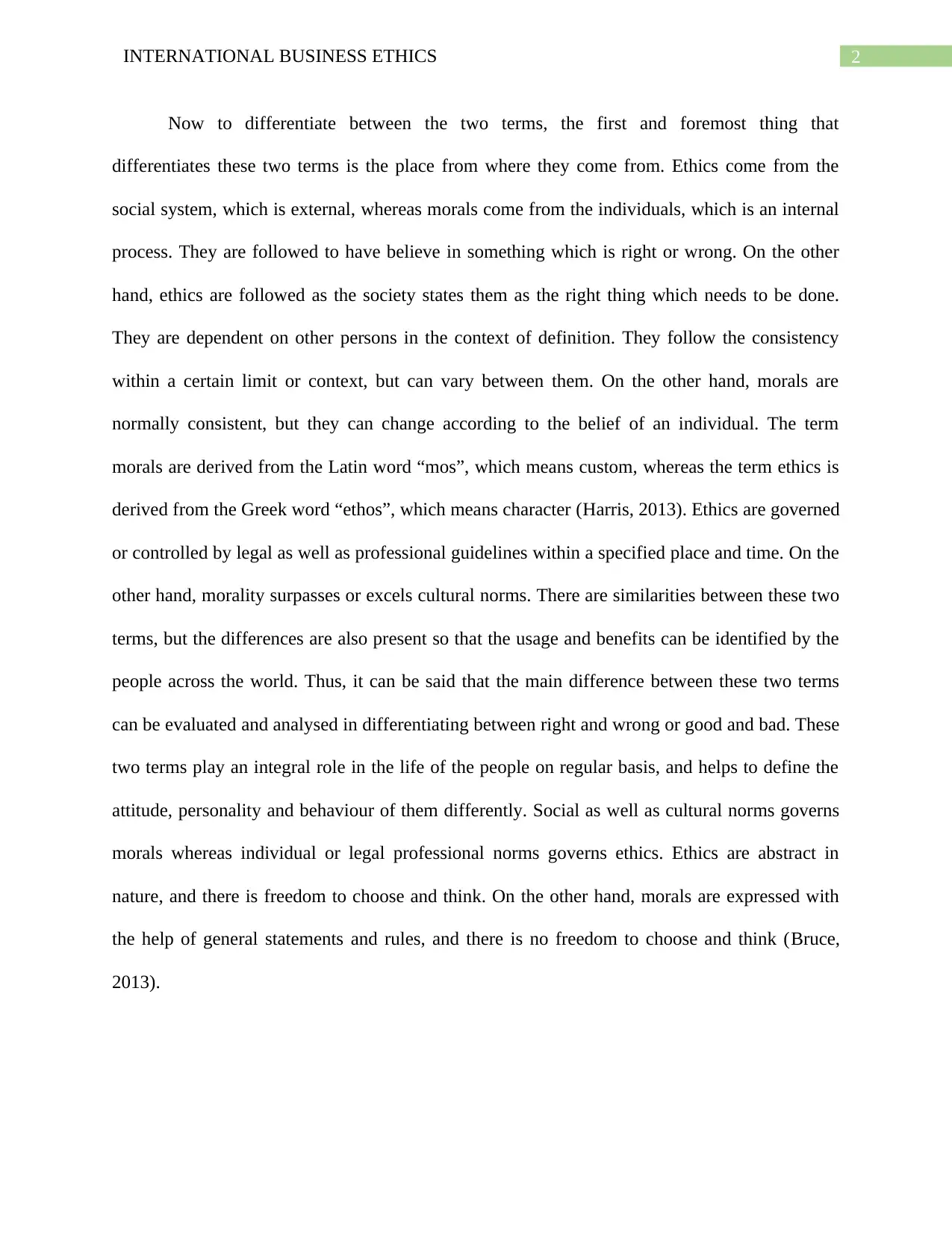
2INTERNATIONAL BUSINESS ETHICS
Now to differentiate between the two terms, the first and foremost thing that
differentiates these two terms is the place from where they come from. Ethics come from the
social system, which is external, whereas morals come from the individuals, which is an internal
process. They are followed to have believe in something which is right or wrong. On the other
hand, ethics are followed as the society states them as the right thing which needs to be done.
They are dependent on other persons in the context of definition. They follow the consistency
within a certain limit or context, but can vary between them. On the other hand, morals are
normally consistent, but they can change according to the belief of an individual. The term
morals are derived from the Latin word “mos”, which means custom, whereas the term ethics is
derived from the Greek word “ethos”, which means character (Harris, 2013). Ethics are governed
or controlled by legal as well as professional guidelines within a specified place and time. On the
other hand, morality surpasses or excels cultural norms. There are similarities between these two
terms, but the differences are also present so that the usage and benefits can be identified by the
people across the world. Thus, it can be said that the main difference between these two terms
can be evaluated and analysed in differentiating between right and wrong or good and bad. These
two terms play an integral role in the life of the people on regular basis, and helps to define the
attitude, personality and behaviour of them differently. Social as well as cultural norms governs
morals whereas individual or legal professional norms governs ethics. Ethics are abstract in
nature, and there is freedom to choose and think. On the other hand, morals are expressed with
the help of general statements and rules, and there is no freedom to choose and think (Bruce,
2013).
Now to differentiate between the two terms, the first and foremost thing that
differentiates these two terms is the place from where they come from. Ethics come from the
social system, which is external, whereas morals come from the individuals, which is an internal
process. They are followed to have believe in something which is right or wrong. On the other
hand, ethics are followed as the society states them as the right thing which needs to be done.
They are dependent on other persons in the context of definition. They follow the consistency
within a certain limit or context, but can vary between them. On the other hand, morals are
normally consistent, but they can change according to the belief of an individual. The term
morals are derived from the Latin word “mos”, which means custom, whereas the term ethics is
derived from the Greek word “ethos”, which means character (Harris, 2013). Ethics are governed
or controlled by legal as well as professional guidelines within a specified place and time. On the
other hand, morality surpasses or excels cultural norms. There are similarities between these two
terms, but the differences are also present so that the usage and benefits can be identified by the
people across the world. Thus, it can be said that the main difference between these two terms
can be evaluated and analysed in differentiating between right and wrong or good and bad. These
two terms play an integral role in the life of the people on regular basis, and helps to define the
attitude, personality and behaviour of them differently. Social as well as cultural norms governs
morals whereas individual or legal professional norms governs ethics. Ethics are abstract in
nature, and there is freedom to choose and think. On the other hand, morals are expressed with
the help of general statements and rules, and there is no freedom to choose and think (Bruce,
2013).
⊘ This is a preview!⊘
Do you want full access?
Subscribe today to unlock all pages.

Trusted by 1+ million students worldwide
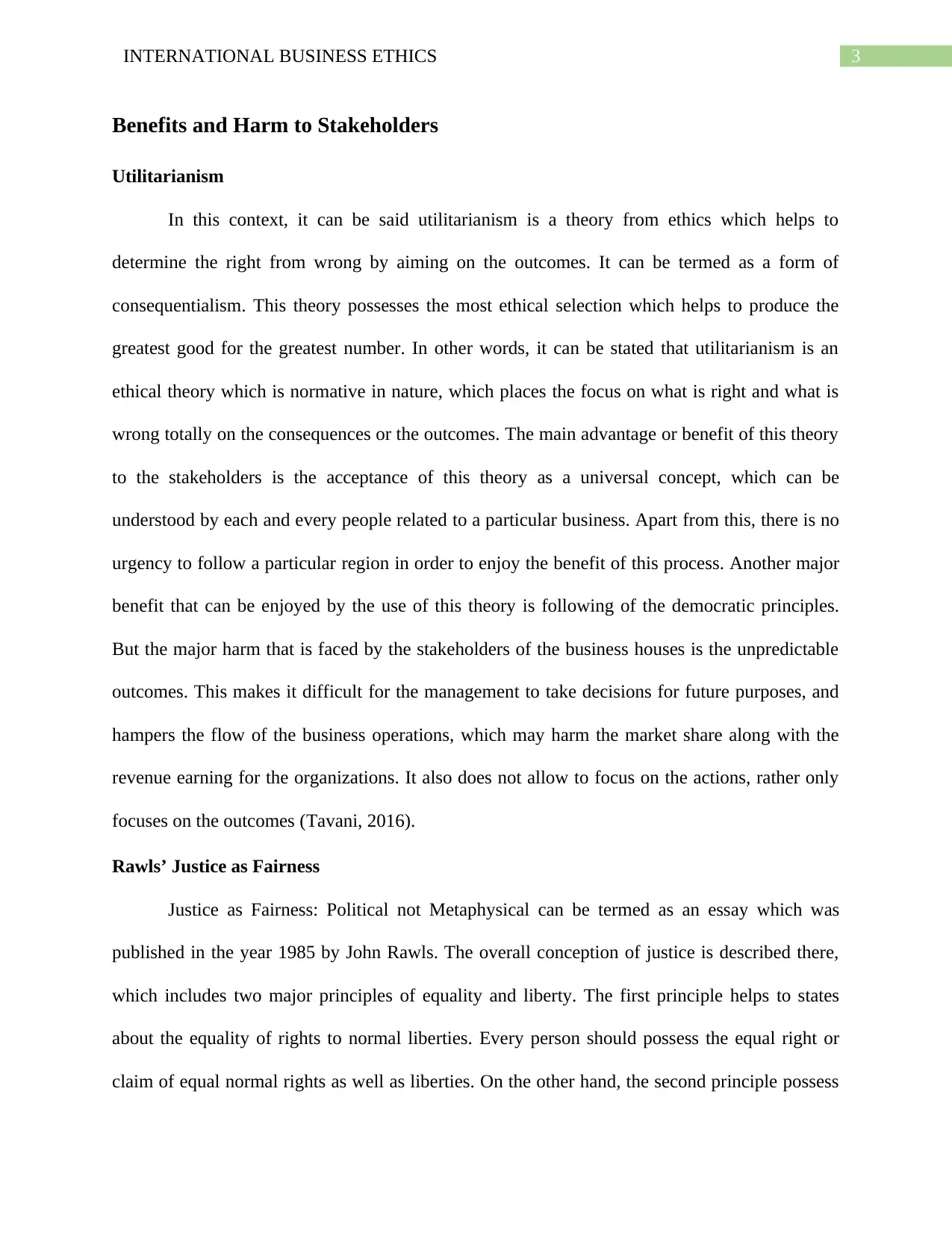
3INTERNATIONAL BUSINESS ETHICS
Benefits and Harm to Stakeholders
Utilitarianism
In this context, it can be said utilitarianism is a theory from ethics which helps to
determine the right from wrong by aiming on the outcomes. It can be termed as a form of
consequentialism. This theory possesses the most ethical selection which helps to produce the
greatest good for the greatest number. In other words, it can be stated that utilitarianism is an
ethical theory which is normative in nature, which places the focus on what is right and what is
wrong totally on the consequences or the outcomes. The main advantage or benefit of this theory
to the stakeholders is the acceptance of this theory as a universal concept, which can be
understood by each and every people related to a particular business. Apart from this, there is no
urgency to follow a particular region in order to enjoy the benefit of this process. Another major
benefit that can be enjoyed by the use of this theory is following of the democratic principles.
But the major harm that is faced by the stakeholders of the business houses is the unpredictable
outcomes. This makes it difficult for the management to take decisions for future purposes, and
hampers the flow of the business operations, which may harm the market share along with the
revenue earning for the organizations. It also does not allow to focus on the actions, rather only
focuses on the outcomes (Tavani, 2016).
Rawls’ Justice as Fairness
Justice as Fairness: Political not Metaphysical can be termed as an essay which was
published in the year 1985 by John Rawls. The overall conception of justice is described there,
which includes two major principles of equality and liberty. The first principle helps to states
about the equality of rights to normal liberties. Every person should possess the equal right or
claim of equal normal rights as well as liberties. On the other hand, the second principle possess
Benefits and Harm to Stakeholders
Utilitarianism
In this context, it can be said utilitarianism is a theory from ethics which helps to
determine the right from wrong by aiming on the outcomes. It can be termed as a form of
consequentialism. This theory possesses the most ethical selection which helps to produce the
greatest good for the greatest number. In other words, it can be stated that utilitarianism is an
ethical theory which is normative in nature, which places the focus on what is right and what is
wrong totally on the consequences or the outcomes. The main advantage or benefit of this theory
to the stakeholders is the acceptance of this theory as a universal concept, which can be
understood by each and every people related to a particular business. Apart from this, there is no
urgency to follow a particular region in order to enjoy the benefit of this process. Another major
benefit that can be enjoyed by the use of this theory is following of the democratic principles.
But the major harm that is faced by the stakeholders of the business houses is the unpredictable
outcomes. This makes it difficult for the management to take decisions for future purposes, and
hampers the flow of the business operations, which may harm the market share along with the
revenue earning for the organizations. It also does not allow to focus on the actions, rather only
focuses on the outcomes (Tavani, 2016).
Rawls’ Justice as Fairness
Justice as Fairness: Political not Metaphysical can be termed as an essay which was
published in the year 1985 by John Rawls. The overall conception of justice is described there,
which includes two major principles of equality and liberty. The first principle helps to states
about the equality of rights to normal liberties. Every person should possess the equal right or
claim of equal normal rights as well as liberties. On the other hand, the second principle possess
Paraphrase This Document
Need a fresh take? Get an instant paraphrase of this document with our AI Paraphraser
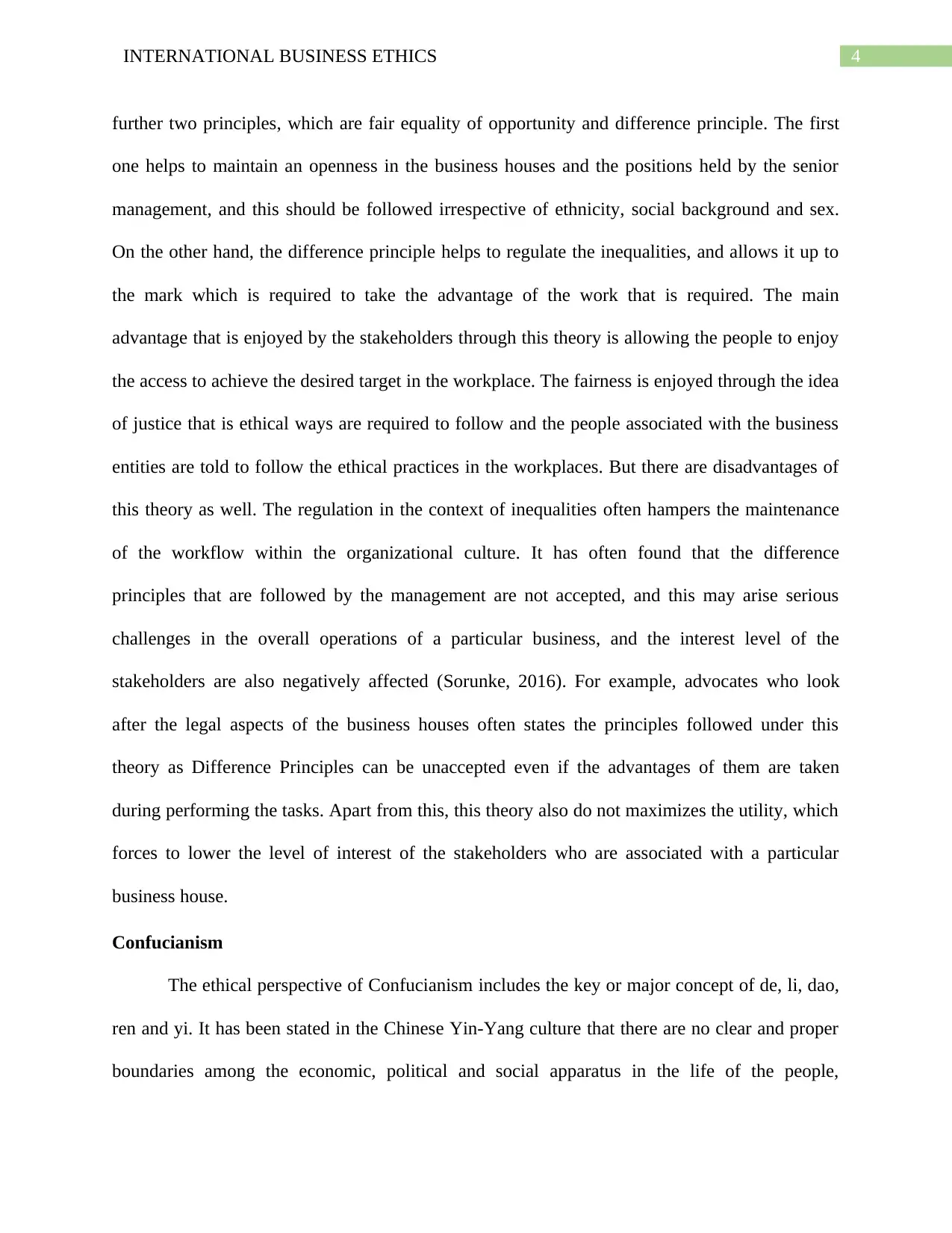
4INTERNATIONAL BUSINESS ETHICS
further two principles, which are fair equality of opportunity and difference principle. The first
one helps to maintain an openness in the business houses and the positions held by the senior
management, and this should be followed irrespective of ethnicity, social background and sex.
On the other hand, the difference principle helps to regulate the inequalities, and allows it up to
the mark which is required to take the advantage of the work that is required. The main
advantage that is enjoyed by the stakeholders through this theory is allowing the people to enjoy
the access to achieve the desired target in the workplace. The fairness is enjoyed through the idea
of justice that is ethical ways are required to follow and the people associated with the business
entities are told to follow the ethical practices in the workplaces. But there are disadvantages of
this theory as well. The regulation in the context of inequalities often hampers the maintenance
of the workflow within the organizational culture. It has often found that the difference
principles that are followed by the management are not accepted, and this may arise serious
challenges in the overall operations of a particular business, and the interest level of the
stakeholders are also negatively affected (Sorunke, 2016). For example, advocates who look
after the legal aspects of the business houses often states the principles followed under this
theory as Difference Principles can be unaccepted even if the advantages of them are taken
during performing the tasks. Apart from this, this theory also do not maximizes the utility, which
forces to lower the level of interest of the stakeholders who are associated with a particular
business house.
Confucianism
The ethical perspective of Confucianism includes the key or major concept of de, li, dao,
ren and yi. It has been stated in the Chinese Yin-Yang culture that there are no clear and proper
boundaries among the economic, political and social apparatus in the life of the people,
further two principles, which are fair equality of opportunity and difference principle. The first
one helps to maintain an openness in the business houses and the positions held by the senior
management, and this should be followed irrespective of ethnicity, social background and sex.
On the other hand, the difference principle helps to regulate the inequalities, and allows it up to
the mark which is required to take the advantage of the work that is required. The main
advantage that is enjoyed by the stakeholders through this theory is allowing the people to enjoy
the access to achieve the desired target in the workplace. The fairness is enjoyed through the idea
of justice that is ethical ways are required to follow and the people associated with the business
entities are told to follow the ethical practices in the workplaces. But there are disadvantages of
this theory as well. The regulation in the context of inequalities often hampers the maintenance
of the workflow within the organizational culture. It has often found that the difference
principles that are followed by the management are not accepted, and this may arise serious
challenges in the overall operations of a particular business, and the interest level of the
stakeholders are also negatively affected (Sorunke, 2016). For example, advocates who look
after the legal aspects of the business houses often states the principles followed under this
theory as Difference Principles can be unaccepted even if the advantages of them are taken
during performing the tasks. Apart from this, this theory also do not maximizes the utility, which
forces to lower the level of interest of the stakeholders who are associated with a particular
business house.
Confucianism
The ethical perspective of Confucianism includes the key or major concept of de, li, dao,
ren and yi. It has been stated in the Chinese Yin-Yang culture that there are no clear and proper
boundaries among the economic, political and social apparatus in the life of the people,
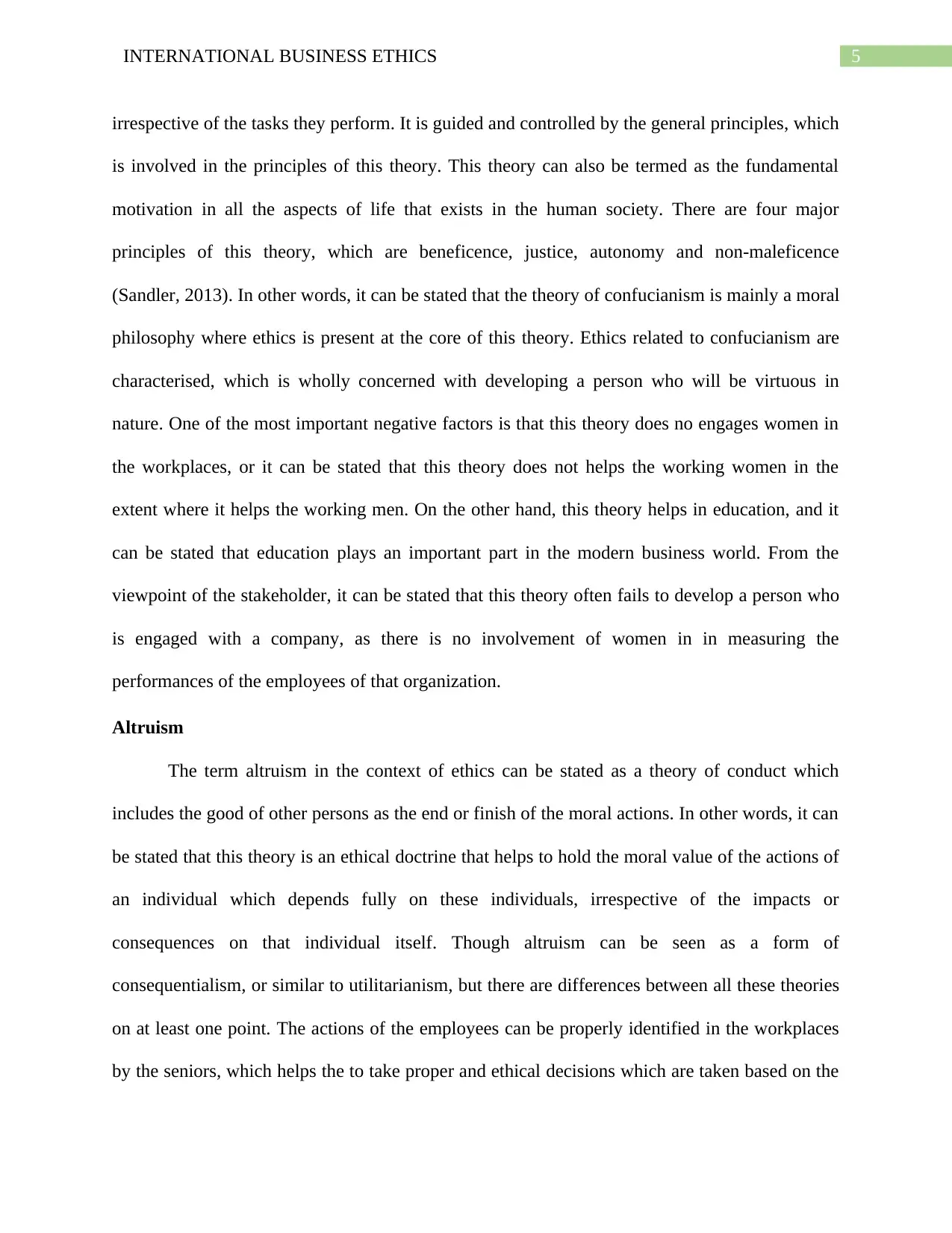
5INTERNATIONAL BUSINESS ETHICS
irrespective of the tasks they perform. It is guided and controlled by the general principles, which
is involved in the principles of this theory. This theory can also be termed as the fundamental
motivation in all the aspects of life that exists in the human society. There are four major
principles of this theory, which are beneficence, justice, autonomy and non-maleficence
(Sandler, 2013). In other words, it can be stated that the theory of confucianism is mainly a moral
philosophy where ethics is present at the core of this theory. Ethics related to confucianism are
characterised, which is wholly concerned with developing a person who will be virtuous in
nature. One of the most important negative factors is that this theory does no engages women in
the workplaces, or it can be stated that this theory does not helps the working women in the
extent where it helps the working men. On the other hand, this theory helps in education, and it
can be stated that education plays an important part in the modern business world. From the
viewpoint of the stakeholder, it can be stated that this theory often fails to develop a person who
is engaged with a company, as there is no involvement of women in in measuring the
performances of the employees of that organization.
Altruism
The term altruism in the context of ethics can be stated as a theory of conduct which
includes the good of other persons as the end or finish of the moral actions. In other words, it can
be stated that this theory is an ethical doctrine that helps to hold the moral value of the actions of
an individual which depends fully on these individuals, irrespective of the impacts or
consequences on that individual itself. Though altruism can be seen as a form of
consequentialism, or similar to utilitarianism, but there are differences between all these theories
on at least one point. The actions of the employees can be properly identified in the workplaces
by the seniors, which helps the to take proper and ethical decisions which are taken based on the
irrespective of the tasks they perform. It is guided and controlled by the general principles, which
is involved in the principles of this theory. This theory can also be termed as the fundamental
motivation in all the aspects of life that exists in the human society. There are four major
principles of this theory, which are beneficence, justice, autonomy and non-maleficence
(Sandler, 2013). In other words, it can be stated that the theory of confucianism is mainly a moral
philosophy where ethics is present at the core of this theory. Ethics related to confucianism are
characterised, which is wholly concerned with developing a person who will be virtuous in
nature. One of the most important negative factors is that this theory does no engages women in
the workplaces, or it can be stated that this theory does not helps the working women in the
extent where it helps the working men. On the other hand, this theory helps in education, and it
can be stated that education plays an important part in the modern business world. From the
viewpoint of the stakeholder, it can be stated that this theory often fails to develop a person who
is engaged with a company, as there is no involvement of women in in measuring the
performances of the employees of that organization.
Altruism
The term altruism in the context of ethics can be stated as a theory of conduct which
includes the good of other persons as the end or finish of the moral actions. In other words, it can
be stated that this theory is an ethical doctrine that helps to hold the moral value of the actions of
an individual which depends fully on these individuals, irrespective of the impacts or
consequences on that individual itself. Though altruism can be seen as a form of
consequentialism, or similar to utilitarianism, but there are differences between all these theories
on at least one point. The actions of the employees can be properly identified in the workplaces
by the seniors, which helps the to take proper and ethical decisions which are taken based on the
⊘ This is a preview!⊘
Do you want full access?
Subscribe today to unlock all pages.

Trusted by 1+ million students worldwide
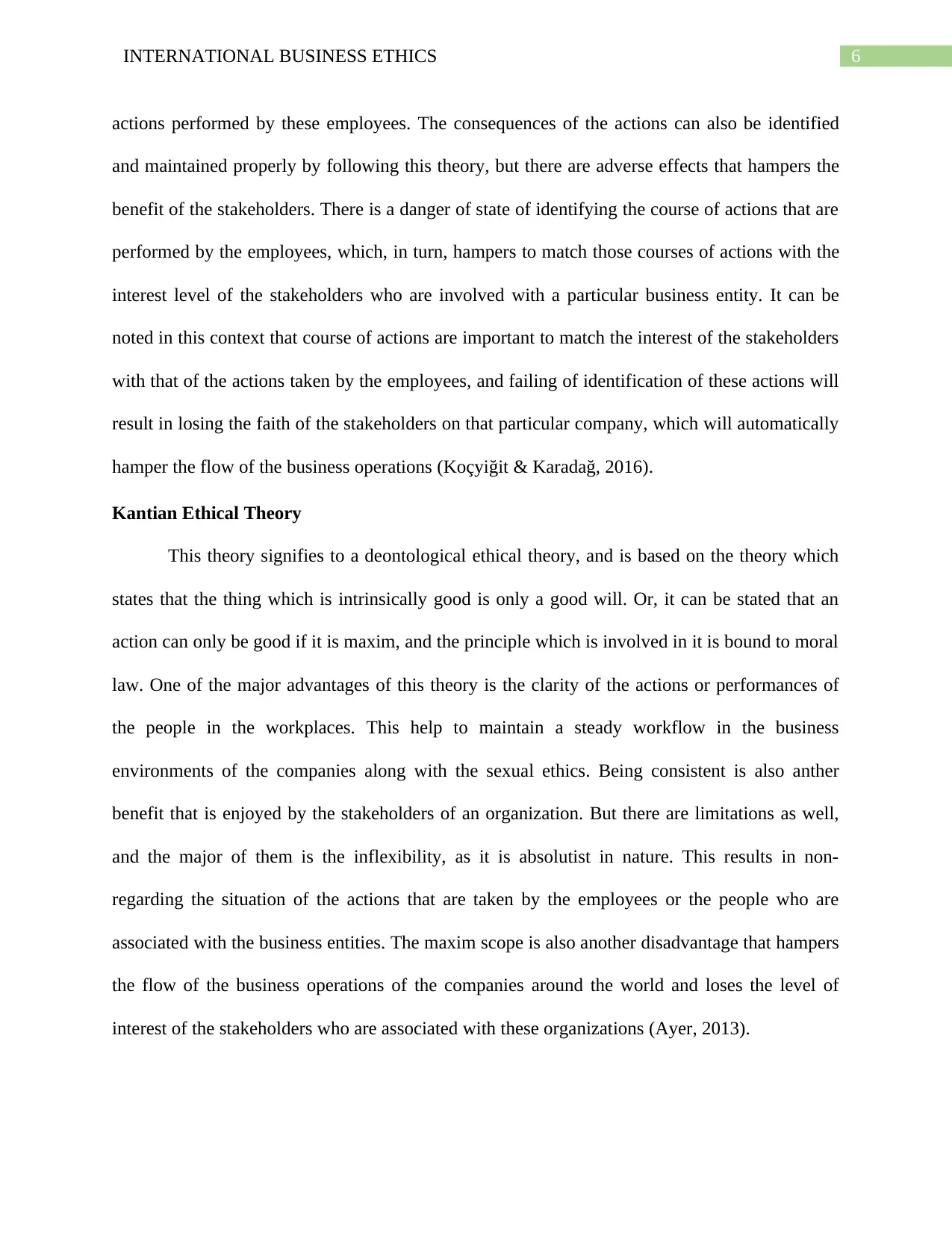
6INTERNATIONAL BUSINESS ETHICS
actions performed by these employees. The consequences of the actions can also be identified
and maintained properly by following this theory, but there are adverse effects that hampers the
benefit of the stakeholders. There is a danger of state of identifying the course of actions that are
performed by the employees, which, in turn, hampers to match those courses of actions with the
interest level of the stakeholders who are involved with a particular business entity. It can be
noted in this context that course of actions are important to match the interest of the stakeholders
with that of the actions taken by the employees, and failing of identification of these actions will
result in losing the faith of the stakeholders on that particular company, which will automatically
hamper the flow of the business operations (Koçyiğit & Karadağ, 2016).
Kantian Ethical Theory
This theory signifies to a deontological ethical theory, and is based on the theory which
states that the thing which is intrinsically good is only a good will. Or, it can be stated that an
action can only be good if it is maxim, and the principle which is involved in it is bound to moral
law. One of the major advantages of this theory is the clarity of the actions or performances of
the people in the workplaces. This help to maintain a steady workflow in the business
environments of the companies along with the sexual ethics. Being consistent is also anther
benefit that is enjoyed by the stakeholders of an organization. But there are limitations as well,
and the major of them is the inflexibility, as it is absolutist in nature. This results in non-
regarding the situation of the actions that are taken by the employees or the people who are
associated with the business entities. The maxim scope is also another disadvantage that hampers
the flow of the business operations of the companies around the world and loses the level of
interest of the stakeholders who are associated with these organizations (Ayer, 2013).
actions performed by these employees. The consequences of the actions can also be identified
and maintained properly by following this theory, but there are adverse effects that hampers the
benefit of the stakeholders. There is a danger of state of identifying the course of actions that are
performed by the employees, which, in turn, hampers to match those courses of actions with the
interest level of the stakeholders who are involved with a particular business entity. It can be
noted in this context that course of actions are important to match the interest of the stakeholders
with that of the actions taken by the employees, and failing of identification of these actions will
result in losing the faith of the stakeholders on that particular company, which will automatically
hamper the flow of the business operations (Koçyiğit & Karadağ, 2016).
Kantian Ethical Theory
This theory signifies to a deontological ethical theory, and is based on the theory which
states that the thing which is intrinsically good is only a good will. Or, it can be stated that an
action can only be good if it is maxim, and the principle which is involved in it is bound to moral
law. One of the major advantages of this theory is the clarity of the actions or performances of
the people in the workplaces. This help to maintain a steady workflow in the business
environments of the companies along with the sexual ethics. Being consistent is also anther
benefit that is enjoyed by the stakeholders of an organization. But there are limitations as well,
and the major of them is the inflexibility, as it is absolutist in nature. This results in non-
regarding the situation of the actions that are taken by the employees or the people who are
associated with the business entities. The maxim scope is also another disadvantage that hampers
the flow of the business operations of the companies around the world and loses the level of
interest of the stakeholders who are associated with these organizations (Ayer, 2013).
Paraphrase This Document
Need a fresh take? Get an instant paraphrase of this document with our AI Paraphraser
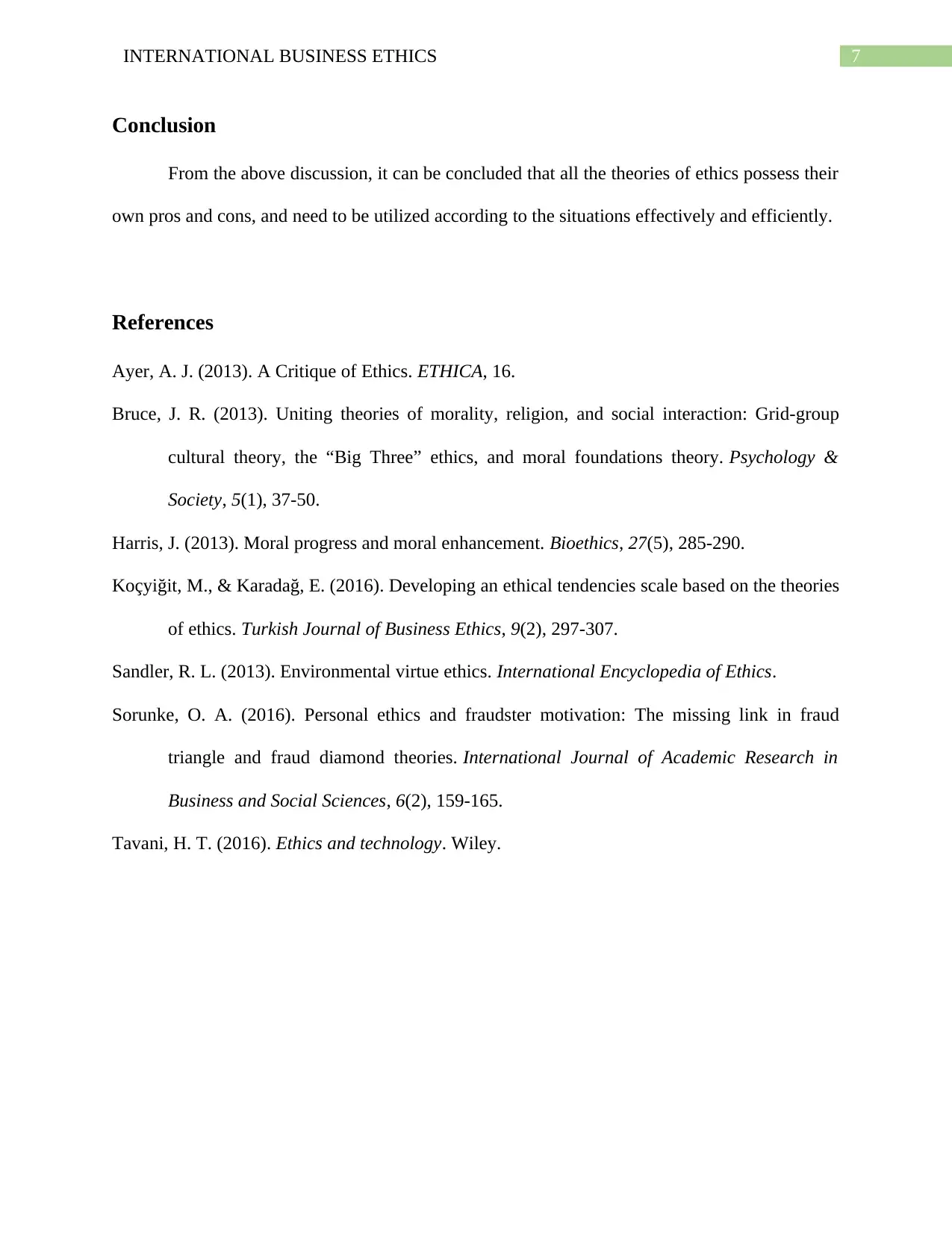
7INTERNATIONAL BUSINESS ETHICS
Conclusion
From the above discussion, it can be concluded that all the theories of ethics possess their
own pros and cons, and need to be utilized according to the situations effectively and efficiently.
References
Ayer, A. J. (2013). A Critique of Ethics. ETHICA, 16.
Bruce, J. R. (2013). Uniting theories of morality, religion, and social interaction: Grid-group
cultural theory, the “Big Three” ethics, and moral foundations theory. Psychology &
Society, 5(1), 37-50.
Harris, J. (2013). Moral progress and moral enhancement. Bioethics, 27(5), 285-290.
Koçyiğit, M., & Karadağ, E. (2016). Developing an ethical tendencies scale based on the theories
of ethics. Turkish Journal of Business Ethics, 9(2), 297-307.
Sandler, R. L. (2013). Environmental virtue ethics. International Encyclopedia of Ethics.
Sorunke, O. A. (2016). Personal ethics and fraudster motivation: The missing link in fraud
triangle and fraud diamond theories. International Journal of Academic Research in
Business and Social Sciences, 6(2), 159-165.
Tavani, H. T. (2016). Ethics and technology. Wiley.
Conclusion
From the above discussion, it can be concluded that all the theories of ethics possess their
own pros and cons, and need to be utilized according to the situations effectively and efficiently.
References
Ayer, A. J. (2013). A Critique of Ethics. ETHICA, 16.
Bruce, J. R. (2013). Uniting theories of morality, religion, and social interaction: Grid-group
cultural theory, the “Big Three” ethics, and moral foundations theory. Psychology &
Society, 5(1), 37-50.
Harris, J. (2013). Moral progress and moral enhancement. Bioethics, 27(5), 285-290.
Koçyiğit, M., & Karadağ, E. (2016). Developing an ethical tendencies scale based on the theories
of ethics. Turkish Journal of Business Ethics, 9(2), 297-307.
Sandler, R. L. (2013). Environmental virtue ethics. International Encyclopedia of Ethics.
Sorunke, O. A. (2016). Personal ethics and fraudster motivation: The missing link in fraud
triangle and fraud diamond theories. International Journal of Academic Research in
Business and Social Sciences, 6(2), 159-165.
Tavani, H. T. (2016). Ethics and technology. Wiley.
1 out of 8
Related Documents
Your All-in-One AI-Powered Toolkit for Academic Success.
+13062052269
info@desklib.com
Available 24*7 on WhatsApp / Email
![[object Object]](/_next/static/media/star-bottom.7253800d.svg)
Unlock your academic potential
Copyright © 2020–2026 A2Z Services. All Rights Reserved. Developed and managed by ZUCOL.





